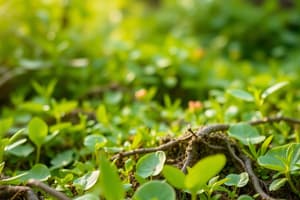Podcast
Questions and Answers
What are biotic factors?
What are biotic factors?
- Factors that affect climate
- Elements that do not influence growth
- Living components that affect other organisms (correct)
- Nonliving components of an environment
What do abiotic factors include?
What do abiotic factors include?
- Living organisms
- Decomposers
- Mutual relationships between species
- Environmental conditions like climate and geology (correct)
What is a decomposer?
What is a decomposer?
Organisms that break down dead or decaying organisms.
What is meant by limiting factors in ecology?
What is meant by limiting factors in ecology?
What is an autotroph?
What is an autotroph?
Define an omnivore.
Define an omnivore.
What defines a herbivore?
What defines a herbivore?
What is a carnivore?
What is a carnivore?
What occurs during primary succession?
What occurs during primary succession?
What characterizes secondary succession?
What characterizes secondary succession?
Define botany.
Define botany.
What is a heterotroph?
What is a heterotroph?
Flashcards are hidden until you start studying
Study Notes
Biotic and Abiotic Factors
- Biotic Factors: Living components in an environment that influence the life of organisms, like predators and prey interactions.
- Abiotic Factors: Nonliving elements affecting ecosystems, encompassing climate, geology, and atmospheric conditions.
Nutritional Roles in Ecosystems
- Decomposers: Organisms that break down dead matter, facilitating nutrient cycling and energy flow in ecosystems; they are heterotrophic, relying on organic substrates.
- Autotrophs: Organisms that produce their own food using inorganic substances and energy sources; examples include green plants, algae, and certain bacteria.
- Omnivores: Animals that consume both plant and animal matter; they can be predators or scavengers depending on their feeding habits.
- Herbivores: Organisms that exclusively eat plants; some feed on living plants while others break down dead plant matter.
- Carnivores: Animals that primarily consume meat from live or dead sources, with some species considered carnivorous despite low meat intake.
Ecological Succession
- Primary Succession: Occurs in lifeless areas with no soil, such as after lava flows or glacier retreats; initiates new ecosystems.
- Secondary Succession: Follows disturbances in established ecosystems, like forest fires, allowing recovery and regeneration using preexisting soil.
Branches of Biology
- Botany: Study of plant life; encompasses various sub-disciplines and is critical for understanding ecosystems; specialists in this field are called botanists.
- Heterotrophs: Organisms that consume other living entities within a food chain, taking on roles of herbivores, carnivores, or omnivores.
Studying That Suits You
Use AI to generate personalized quizzes and flashcards to suit your learning preferences.




